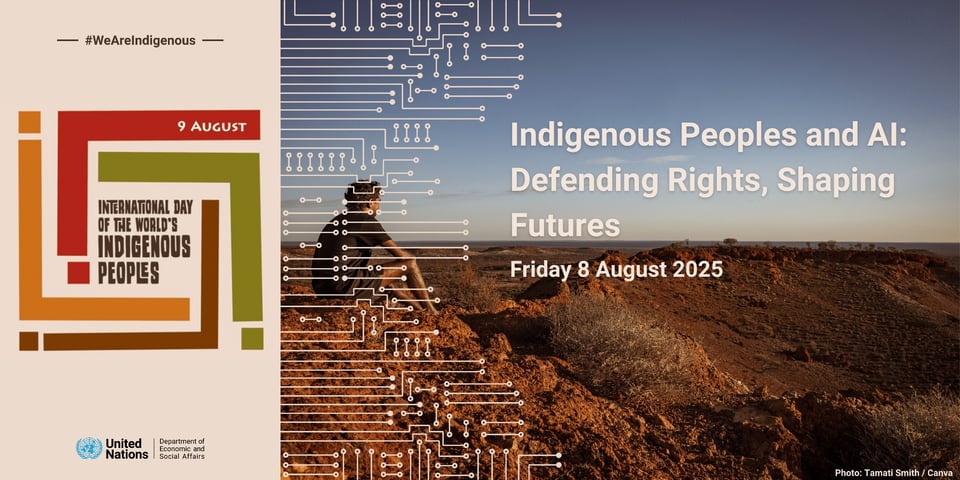Virtual Event for International Day of the World’s Indigenous Peoples
Panelists to discuss IDSov and AI for UN’s commemoration event happening this Friday August 8th

Boozhoo News River Readers,
This week's news cycle is full of interesting stories about Indigenous Data Sovereignty and how it intersects with the development of AI. It’s also the topic of the UN’s 2025 commemoration of the International Day of the World’s Indigenous Peoples, with a virtual event happening the morning of Friday August 8th. We encourage you to attend alongside us,
Thanks for being here!
This week’s stories include:
How to ensure digital storytelling serves as a means of cultural resurgence and relational accountability - rather than a tool of knowledge extraction.
A conversation about two transformative forces as they converge: the climate crisis and the burgeoning AI revolution.
How intentional engagement with Indigenous researchers and communities can minimize harm and maximize benefits for all participating in research and technology development.

Virtual Commemoration on 8 August 2025 - Indigenous Peoples and AI: Defending Rights, Shaping Futures
The big picture:
The International Day of the World’s Indigenous Peoples is celebrated globally on 9 August. It marks the date of the inaugural session of the Working Group on Indigenous Populations in 1982. To commemorate the International Day, the Department of Economic and Social Affairs (DESA) is organizing a virtual commemoration on Friday 8 August 2025 on the theme: Indigenous Peoples and AI: Defending Rights, Shaping Futures.
Why it matters:
While AI offers great potential, it also brings significant risks. This holds especially true for Indigenous Peoples. UN General Assembly resolution A/RES/78/265 from 2024 emphasized that human rights and fundamental freedoms must be respected, protected and promoted throughout the life cycle of artificial intelligence systems. Respecting Indigenous Peoples’ rights is essential to realizing the positive potential of AI and avoiding perpetuating harm. Without safeguards, the potential of AI is unlikely to be distributed equitably and may instead contribute to widening digital divides. Left unchecked, AI risks perpetuating colonial legacies.
Key points:
Indigenous Peoples’ rights to self-determination, lands, territories, resources and languages, as well as the right to free, prior, and informed consent (FPIC), are well-established in international law. AI development, implementation and governance intersects directly with this. Upholding these rights in the AI context is essential to ensure that AI does not reproduce historical patterns of exclusion, marginalization, and appropriation.
The extraction of knowledge/data for training purposes, building of resource intense infrastructure such as data centers, and the mineral extraction required for electronics all impact Indigenous Peoples. This leads to biased misrepresentations, land dispossession, environmental degradation, and also threatens peoples cultural, spiritual and physical health.
Indigenous Peoples are not only users of AI, they are cocreators, decision-makers, and rights-holders. As such, Indigenous Peoples must be meaningfully part of AI development, implementation and governance to avoid perpetuating harms, and realizing the positive potential of AI.
What they’re saying: “I’ll be joining to talk about AI ethics, how big tech is taking advantage of our communities, and what we can do about it to defend our sovereignty. I’ll be joined with others from Indigenous communities around the world.” Danielle Boyer, Anishinaabe, Robotics Inventor and Founder of SkoBots, who will be a panelist at this Friday’s online event.
Learn more: Visit the official event page to view more panelists and register to attend!
Curated Articles:
Reclaiming Data for Indigenous Dreaming & Self-Determination
Since NDN Collective was founded, we have known the importance of collecting data that is by Indigenous people, for Indigenous people. We do this work through research and evaluation, which are processes of gathering, understanding, and acting on data. Terms such as research, evaluation, learning, and monitoring are often used when talking about how people and organizations can collect data to measure impact, or the real-world effects of their work. It might seem like these practices are confined to academic settings, or that they are removed from human-centered and community-based work because of their focus on data collection and analysis. However, Indigenous people continue to collect data to benefit our communities, just as we have done for thousands of years. We recognize that many systemically oppressed communities have traumatic experiences with how their data has been collected and used. Research and evaluation have been exploited as tools of colonialism to further epistemicide (silencing and erasing knowledge) and justify harm. To reclaim research and evaluation, it’s important to look to our ancestors. Indigenous people are the first scientists, researchers, and evaluators; we have been engaged in this work since time immemorial.
In This AI Age, How Best to Handle Patient Health Data?
An ethical debate pits privacy against medical advances. Here are five key recommendations. In Canada’s rapidly evolving digital health landscape, questions about how health data is accessed, stewarded and commercialized are becoming harder to ignore. Recent calls from artificial intelligence experts and federal advisers for greater data transparency underscore a growing tension: how do we unlock the power of health data while protecting public trust? Too often, the debate becomes polarized. On one side, there are urgent calls to safeguard patient health information from misuse or commercial exploitation. On the other, there’s pressure to leverage patient data for innovation, improved population health and system-wide efficiency. These positions are often treated as mutually exclusive, but there is truth that lies in this tension. The emergence of AI intensifies these tensions.
There is growing recognition of the moral and legal authority of Indigenous Peoples to regulate research and other matters that involve their communities under the principle of Indigenous Data Sovereignty (IDS). This systematic review has two aims: (1) detail IDS considerations and practices in health research in the United States and other global contexts; and (2) identify frameworks that operationalize IDS practices for responsible conduct of research and use of data-driven technologies. Our review returned 41 relevant articles detailing specific considerations for the collection, access, and use of Indigenous data, and sub-themes such as cultural and regional considerations. More than half of the articles articulated a theoretical framework or detailed set of guidelines for using Indigenous data, with two especially focused on digital data considerations. Results indicate that intentional engagement with Indigenous researchers and communities will minimize harm and maximize benefits for all participating in research and technology development.
Is this how you can ensure climate justice in the age of AI?
Artificial intelligence (AI) has permeated all walks of life, including climate action. From predicting extreme weather to optimizing energy systems, climate action increasingly incorporates AI to boost its effectiveness. There’s a growing imperative, however, to ensure that emerging technologies don’t intensify existing inequalities or further marginalize vulnerable groups. Climate justice is about fair treatment and meaningful involvement of all people in a world impacted by climate change, regardless of their background, income, race, gender, or geography. It must be deeply embedded in the design and deployment of AI for sustainability. This conversation needs urgent reckoning as two transformative forces converge: the climate crisis and the burgeoning AI revolution.
Digital climate knowledge centers, which serve as virtual hubs by providing crucial data and adaptation information, are essential for addressing the specific impacts of climate change on Indigenous communities. Indigenous Peoples face unique vulnerabilities due to climate change threats to food security, water resources, and cultural continuity. The objective of this systematic scoping review is to contextualize these challenges… Several key themes emerged, including the importance of drawing on both Indigenous and Western knowledge systems to create these climate knowledge centers, the role of community-based participatory research in aligning with place-based community interests, and the need for frameworks that support Indigenous self-determination and ensure the protection of intellectual property rights. In this study, we also emphasize the importance of integrating Indigenous sovereignty principles to dismantle oppressive systems and promote initiatives of collaborative and participatory approaches to developing digital climate knowledge centers tailored for Indigenous communities.
Cultural sovereignty and the future of Indigenous digital storytelling
Indigenous digital storytelling extends beyond sharing narratives—it is a practice of cultural sovereignty, self-determination, and knowledge stewardship. Digital storytelling aligns with Indigenous research methodologies, emphasising relationality, oral traditions, and community-centred knowledge production, ensuring that these stories remain rooted in Indigenous ways of knowing and being. While digital media provides opportunities for Indigenous communities to share their narratives, it also poses risks of appropriation, misrepresentation, and external control. This study examines how relational design and participatory methodologies can support Indigenous digital storytelling while respecting cultural protocols and reinforcing community governance. By critically analysing existing storytelling frameworks, we explore whether participatory design genuinely empowers Indigenous voices or perpetuates extractive practices. Drawing on Indigenous methodologies, ethical review, and governance models, we highlight the need for community-driven digital storytelling platforms that prioritise Indigenous agency. Rather than adapting Indigenous narratives to fit mainstream digital spaces, this research advocates for technologies shaped by Indigenous epistemologies—ensuring that digital storytelling serves as a means of cultural resurgence and relational accountability rather than a tool of knowledge extraction.

Add a comment: